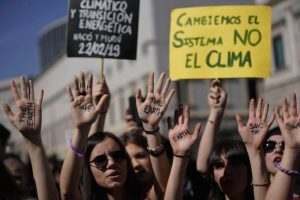The movement #FridaysForFuture1 has been summoning demonstrations, protests and student gatherings all over the planet every Friday since the end of 2018, which will culminate on March 152 with a global student strike to demand strong actions from the political class to reverse climate change.
This movement took special momentum after the speech that Swedish student and activist Greta Thunberg gave on December 12, 2018 before the COP24 (United Nations Climate Change Conference)3. From that moment on weekly student demonstrations have been taking place all over Europe, especially in Belgium, where they are especially multitudinous. In other European and world countries, such as Spain, France, the United Kingdom, Germany, Japan, the US, Switzerland and the Netherlands, there are more and more demonstrations every Friday4.
The UN agency that assesses climate change through a thorough scientific analysis, the IPCC (Intergovernmental Panel on Climate Change), states in its latest report that the degree of certainty that human activity is behind the increase in the planet’s temperature is currently at 95%5; and, even though #FridaysForFuture maintains that this increase should not exceed 2ºC from now to 2100, the IPCC insists on the need not to exceed a 1.5ºC increase, while ensuring that it is perfectly plausible⁶. If we do not assume a radical change in our environmental policies, the IPCC ensures that we will suffer globally the rise in sea level, extreme weather events (droughts, floods…), major losses in agriculture, livestock or tourism, desertification, losses of river flows, etc. All this will have serious consequences that will lead to significant economic losses, wars over access to water and natural resources, climatic refugees and many other problems that probably can not yet be predicted in the near future7.
The essence of capitalism is unlimited growth, based on the exploitation of the planet and those who inhabit it. The neoliberal conception of the planet as a pantry from which to extract resources in an unlimited way to nourish the consumer society, clashes frontally with the limited nature of the planet8. Thus, the #FridaysForFuture movement can lead to a greater and better environmental awareness of society so that the pressure on governments and powers escalate exponentially in order to address the issue as needed. For the time being, the Minister of the Flemish environment has resigned9 and, if these mobilizations are to flourish, the political debate on this issue will definitely be in focus. March 15 can be a turning point.
1https://www.fridaysforfuture.org/
2https://www.fridaysforfuture.org/events/map
3https://www.youtube.com/watch?v=wYr3DNWcFO0
4https://www.dw.com/en/fridays-for-the-future-students-rally-for-the-climate/g-47739485
5https://es.wikipedia.org/wiki/Grupo_Intergubernamental_de_Expertos_sobre_el_Cambio_Clim%C3%A1tico#Quinto_Informe
6https://www.ipcc.ch/sr15/chapter/chapter-3/
7https://elpais.com/internacional/2015/10/26/actualidad/1445872107_049759.html
8https://www.lavanguardia.com/medio-ambiente/20120608/54308828129/puede-haber-capitalismo-ecologico.html
9[https://elpais.com/sociedad/2019/02/07/actualidad/1549559299_672538.html
More information:
https://www.fridaysforfuture.org/
Become interested:


